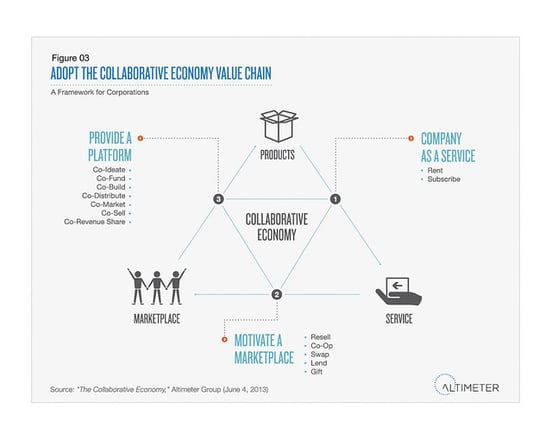Recently, I attended a great event, Becoming a Customer Company and was fortunate to hear from Jeremiah Owyang (Altimeter Group), Peter Coffee (Salesforce.com) and many others. The audience consisted of hundreds of marketing, sales and other leaders, including many from Fortune 500 companies. As keynote, Jeremiah discussed the impetus for companies to join in the Collaborative Economy.
Social technology, an abundance of used goods available, new groups of Conscious Consumers wishing to reduce needless consumption, the rapid increase in the earth's population (over 7 billion and counting) and fixed resources are creating the perfect storm for a Collaborative Economy. AirBnB, TaskRabbit, Lyft and many other online tools are facilitating customers' sharing, both in what they have available and what they wish to use. Aside from consumables such as food, gas and personal health care items, people are not buying new products. With this change, consumers' relationships with brands are changing. Further, there are lifestyle movements underway that embrace and perpetuate these changes including the asset light movement and minimalism movement. Companies must adapt or be disrupted.
In our household, for example, we have chosen to give away much of what we do not use on a regular basis. That means goodbye to aspirational and nostalgic clutter such as all those “someday” projects and hand-me-downs about which we could no longer recall the sentimental reasons to keep them. Further, very seldom do we bother to buy new things, preferring instead to “use it up, wear it out, make it do or do without.” More recently we have been going online to find ways to borrow, barter or rent what we need seasonally or otherwise. We are not alone.
The majority of consumers' activity is facilitated via various startups which represent every industry and sector. The crowd gets what they need from each other without accessing corporations, brands, retailers or merchants. The opportunity for corporations, brands, retailers and merchants requires companies to let go of control and in exchange they gain more of the market. This process is called the Economy Value Chain and there are three key opportunities for businesses to work with startups and the crowd. 
- Company as a Service: Companies offer products on demand for rent or on a subscription basis (don't sell a razor once, sell it 100X);
- Motivate a Marketplace: Companies enable their customers to sell used goods (companies can take a cut or add value services); and
- Provide a Platform: Companies collaborate with the crowd, reducing costs and increasing innovation.
In short, this is a business disruption and companies must understand what is already underway and learn how to fit into the changing economy. To learn more about the concept of the Collaborative Economy, please download Jeremiah Owyang's report.
Additional source: Report: Corporations must join the Collaborative Economy , Jeremiah Owyang, Altimeter





